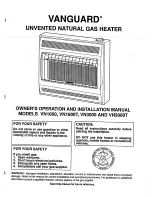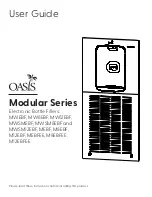
lp-441 Rev. 004 Rel. 000 Date 7.2.21
19
B. Approved Materials for Exhaust Vent and Intake Pipe
Table 6 - Approved Materials for Exhaust Vent and Intake Pipe
High heat sources (generating heat 100
o
F / 37
o
C or greater, such
as boiler flue pipes, space heaters, etc.) may damage plastic
components of the water heater as well as plastic vent pipe
materials. Such damages ARE NOT covered by warranty. It is
recommended to keep a minimum clearance of 8” from high heat
sources. Observe heat source manufacturer instructions, as well
as local, state, provincial, and national codes, laws, regulations,
and ordinances when installing this water heater and related
components near high heat sources.
NOTE:
The use of double-wall vent or insulated material for the
combustion air intake pipe is recommended in cold climates to
prevent the condensation of airborne moisture in the incoming
combustion air.
C. Additional Requirements for Installation in Canada
1. Installations must be made with a vent pipe system certified to
ULC-S636.
2. The first three (3) feet of vent pipe from the appliance flue outlet
must be readily accessible for visual inspection.
3. The components of the certified vent system must not be
interchanged with other vent systems or unlisted pipe / fittings.
You must not use “B” vent in an exhaust application. “B” vent is for
intake applications ONLY. Using “B” vent in an exhaust application
will result in serious injury or death.
•
The exhaust and intake components installed with this appliance must be used for near appliance piping BEFORE transitioning to the
approved materials listed above. DO NOT REMOVE these installed components. Doing so WILL VOID appliance warranty.
•
In the US/Canada, PVC vent pipe and fittings SHALL NOT BE USED within the closet or alcove. Only approved CPVC, Polypropylene, or
Stainless Steel vent pipe and fittings may be used.
•
PVC / CPVC pipe and fittings of the same diameter are considered interchangeable.
•
The use of cellular core PVC (ASTM F891), cellular core CPVC, or Radel
®
(polyphenolsulfone) in exhaust venting systems is prohibited.
•
Covering non-metallic vent pipe and fittings with thermal insulation is prohibited.
•
When installing AL29-4C vent piping, DO NOT mix AL29-4C piping from different manufacturers unless using adapters specifically
designed for the purpose by the manufacturer.
•
DO NOT mix components from different venting systems without proper adapters. The vent system could fail, causing leakage of flue
products into the living space. Use only the approved pipe and fitting materials, and primer and cement specifically designed for the
material used, as listed in the above table.
•
A double wall vent or insulated material may be used when using stainless steel vent material in a freezing climate.
•
*ABS may be used for air intake applications ONLY.
•
Contact the venting material manufacturer if there is any question about the applicability of the proposed venting material.
Failure to follow these directions will result in substantial property damage, severe personal injury, or death.
Item
Material
Standards for Installation In:
United States
Canada
Pipe and Fittings Approved for Intake ONLY
ABS*
ANSI/ASTM D2661
ANSI/ASTM D2661
Pipe Approved for
Intake OR Exhaust Vent
PVC Schedule 40/80
UL-1738 or ANSI/ASTM D1785
UL-1738 or ULC-S636
PVC-DWV Schedule 40/80
UL-1738 or ANSI/ASTM D2665
CPVC Schedule 40/80
UL-1738 or ANSI/ASTM F441
Polypropylene
UL-1738 or ULC-S636
Stainless Steel AL29-4C
Certified for Category IV and Direct Vent Appliance Venting
Pipe Fittings
PVC Schedule 40
UL-1738, ANSI/ASTM D2466
or D2665
UL-1738 or ULC-S636
PVC Schedule 80
UL-1738, ANSI/ASTM D2467
or D2665
CPVC Schedule 40
UL-1738 or ANSI/ASTM F438
CPVC Schedule 80
UL-1738 or ANSI/ASTM F439
Pipe Cement
ABS*
ANSI/ASTM D2235
ANSI/ASTM D2235
PVC
ANSI/ASTM D2564
ULC-S636 Approved Cements
and Primers
CPVC
ANSI/ASTM F493
Pipe Primer
PVC / CPVC
ASTM F656
















































